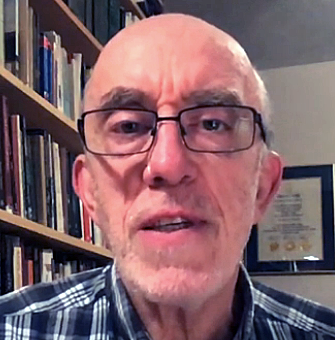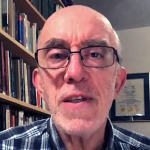When you are simply trying to be faithful, putting one foot in front of the other, the Spirit often provides a spark that ignites more of a fire than you ever anticipated. In March, at the beginning of this pandemic, while feeling hemmed in by shelter-in-place orders, we wondered how to help people stay connected with one another and engaged with the Gospel. One unexpected answer would emerge.
Early on in March, I felt I needed to send a personal video message to the congregation, with a Gospel focus, some words of encouragement and a call to prayer. I chose the Gospel from the daily office lectionary. There was no plan beyond that. For all I knew, it was a one-off.
Sharing ‘Good News for Today’
That evening, my wife and I thought it would be good to invite our Family Ministry Pastor to do a video, too. Of course, he agreed. The next day, it was Mona’s turn—my wife is our honorary assistant. But why stop at just the clergy team? Let’s see if the lay leaders of worship might join in; three of them have been studying theology. Three more videos followed. One full week of daily Gospel messages already! We left Sunday for worship to do its own work.
There was a good response to the videos and we were enjoying making them. Why not invite the other two lay leaders and a few others to contribute? Within three weeks, we had 20 people (including some couples) on a 15-day cycle, sharing Good News for Today. The Good News arrives in your inbox every morning at 9 a.m.; each day it features a different voice, a different face, on a two-and-a-half-week rotation. Some participants have prepared eleven or twelve Good News videos since March.
From the responses of the congregation and the participants, we believe this should continue and grow beyond the pandemic. Many members (between 50-80) of the congregation watch the videos each day and they often share them with friends and on Facebook.
“God writes straight with crooked lines”
Our people are digging into the Bible and into their own relationship with God in Christ. They are reading, raising questions, pondering together and seeking to allow the Good News to speak into this time of uncertainty and crisis.
Wycliffe College’s Christian Foundations book may have given us a head start with this. We used the book last year in a variety of ways. Sometimes, we used it to start a conversation in a parish team or committee meeting. Other groups gathered intentionally around its themes for an hour or two. Gradually people got more comfortable talking about their faith.
An old Iberian proverb (maybe from Teresa of Avila) says: “God writes straight with crooked lines.” You cannot know what the outcomes of new ventures will be.
Now, no straight line leads from our parish’s engagement with Christian Foundations directly to a daily Good News ministry in our congregation. Nor is it clear how sharing Good News videos in the pandemic with fellow parishioners will help our church to move into the future as a strong, vital, evangelistic church. Each occurrence is simply one step on our community’s unfolding journey on the Way of Jesus.
The way forward
The way forward disappears from view around the next curve. But allow me to hazard a few hunches about what it may be like:
- God works with those who step out faithfully, allowing the Spirit to lead even when it feels safer to remain as they are. If, by stepping out, we make mistakes, God can definitely work with those. The ancient stories reflect this at every turn; God’s call is to follow, often with destination unknown.
- Unlike the Cheshire Cat’s philosophy in Alice in Wonderland, “If you don’t know where you’re going, any path will get you there.” This stepping out is not about blundering along, but it is about wondering openly, then moving forward decisively, at each step. It is about being attentive to the Spirit and allowing yourself to respond, ready to say ‘Let’s go this way!’ without second-guessing yourself too much before you do.
- Learning to be natural and confident about sharing Good News begins with encouraging one another to be open to our own and others’ questions, and moving beyond the need to always have the ‘right answers.’
- Clergy who are nurturing Good News ministries will learn to not be hyper-vigilant about people’s theological (shall we say) inconsistencies, but, rather, to step together with them into the questions they raise.
- A crisis like Covid-19 disrupts our need for safety so much that it may, ironically, open us up to risk and adventure in our spiritual lives. . . . Or maybe we just have more time to wonder about where God fits in a world that has been thrown into confusion?
- Theologically, this is a very fertile time. Clichéd ways of thinking about our relationship with God are being disrupted. God is full of surprises—and just realizing that may itself disrupt our theological worldview.
- Those who felt secure in their theological foundations are now called to re-think foundational questions. And these are the kinds of questions people ask once they begin to dig into the Word: What is God up to? How does Christ overcome the power of death? Where is the Spirit calling me/us to? What is Church for? What is mission now? Has ministry changed? Whom have we neglected pastorally (elders, or the vulnerable)? How will we worship in community now? What is our vision of the Kingdom of God?
The winding road beckons
The next step for our church is to wonder and listen for where the Spirit is nudging us now. This ministry is not just for the pandemic, so it will continue, but how? Will we begin to share these reflections beyond our church? People are finding courage to speak to one another about their faith. How will the same people now find courage to invite others—those in their circles of acquaintance, their friends and families—into the same conversations?
The winding (if not exactly ‘crooked’) road beckons. I am excited to see where God will take us.


